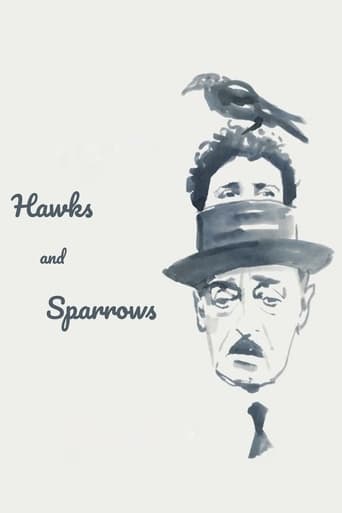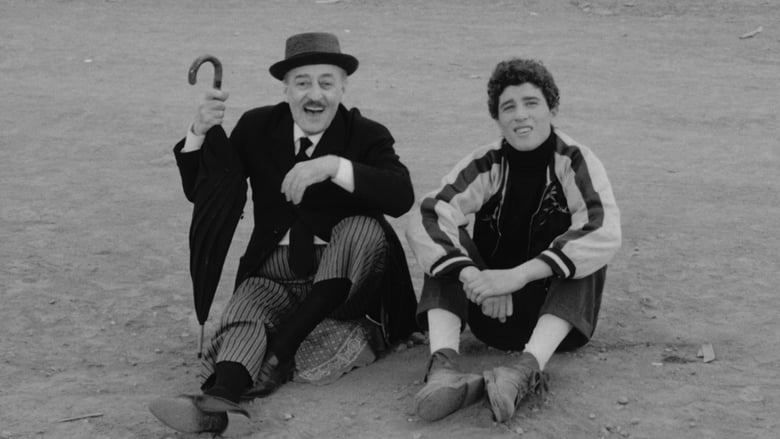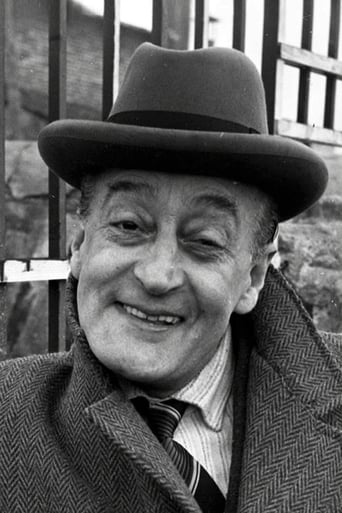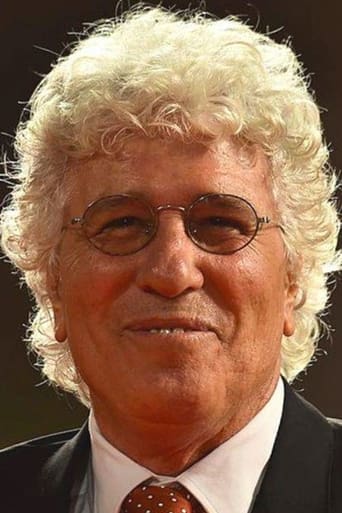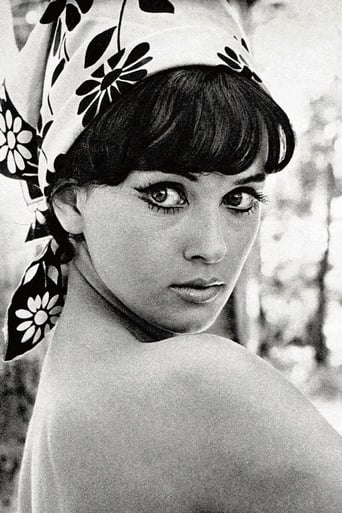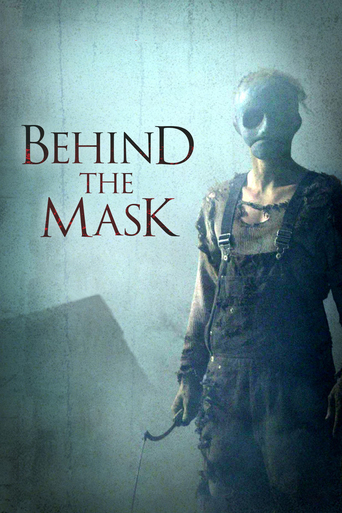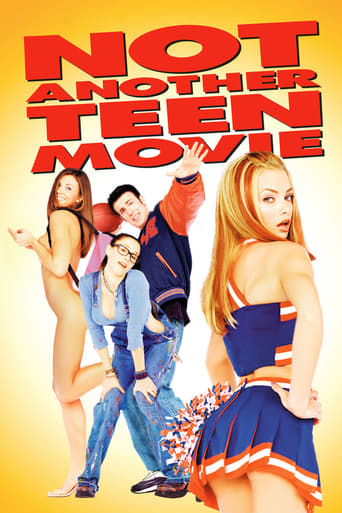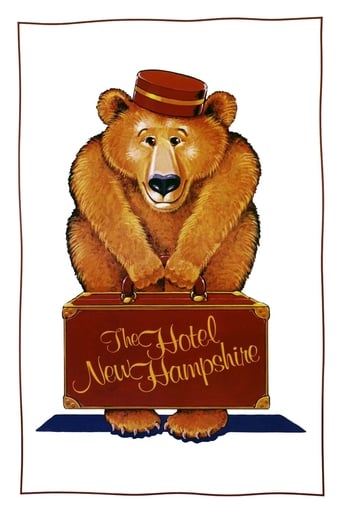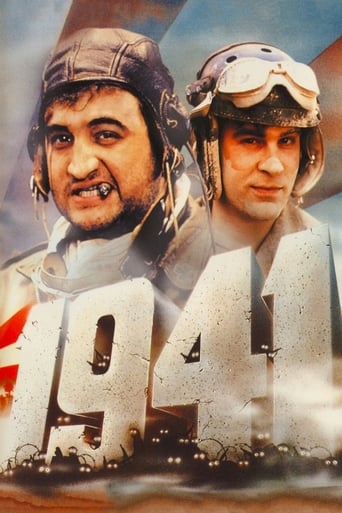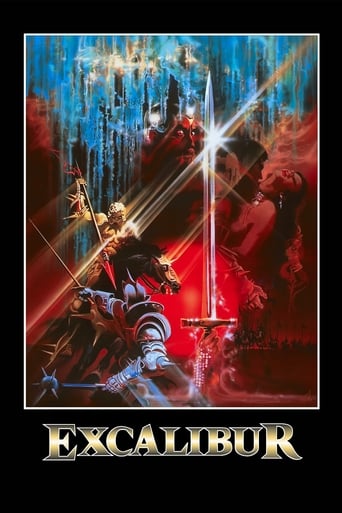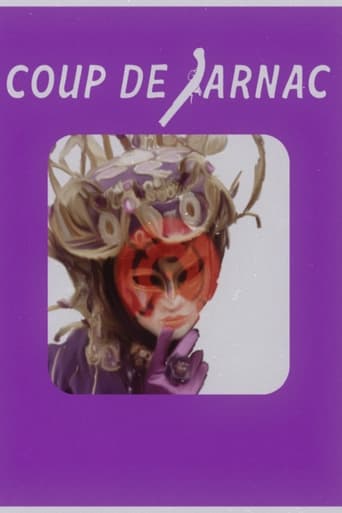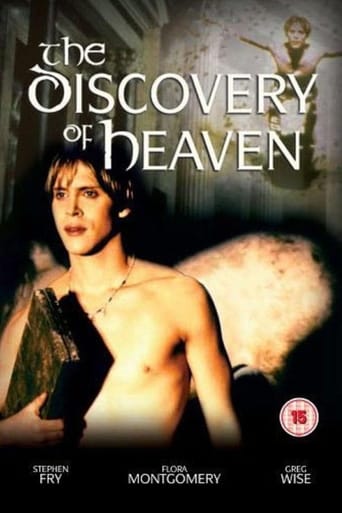The Hawks and the Sparrows (1967)
A man and his son take an allegorical stroll through life with a talking bird that spouts social and political philosophy.
Watch Trailer
Cast


Similar titles
Reviews
Waste of time
Sorry, this movie sucks
While it is a pity that the story wasn't told with more visual finesse, this is trivial compared to our real-world problems. It takes a good movie to put that into perspective.
There's no way I can possibly love it entirely but I just think its ridiculously bad, but enjoyable at the same time.
'Hawks and Sparrows' is the most Buñuel of Pasolini's early films in both mischevious tone and religiously subversive subject matter. The film even hints at Surrealism as much as it does Marxism, featuring a talking raven (described as a 'left-wing intellectual'), which is clearly an avatar for Pasolini, and a quarrel of hungry pagan sparrows that are converted to Christianity by monks with the lure of food.It is very light-hearted and comedic on the surface but this is dangerous, confrontational art when you understand the symbolism, the kind of filmmaking that made Pasolini many enemies. Both Italian film legend Totò and young Ninetto Davoli are excellent and have enjoyable chemistry together, the rest of the cast is mostly made up of neorealist non-actors.
I'm not normally a fan of Pasolini, but this not very well known film from 1966, a kind of bridge between his earlier realistic films (Accatone, Mamma Roma) and the later explorations into the realm of popular myth (the medieval Trilogy), is worth a look. It stars the legendary Italian comic Toto, and Ninetto Davoli, who was Pasolini's lover and would be featured in many of his films. The pair engages in a number of comic misadventures, both in the Italy of the mid 60s (where they walk through what seems to be a huge urban wasteland), and in medieval times, where they appear as disciples of Saint Francis of Assisi. The movie is shot in a free-form style, has a lot of off the cuff humor, and is a sort of an odd combination between the theater of the absurd, the slapstick comedy of the silent movie era and the political films of Jean Luc Godard. There are also many quotes for thinkers revered by the European left of the time, as well as a talking crow. The movie ends up showing the funeral of longtime Italian communist leader Palmiro Togliatti, though given Pasolini long time support of Italian communism is not clearly what this means.
"Uccellacci e uccellini" aka "The Hawks and the Sparrows" (1964) - directed by Pier Paolo PasoliniThis is a movie that begins like no other introducing the cast and the crew in the manner that is charming, original, melodious and promising of even better things to follow. The fun begins actually with its Italian title, "Uccellacci e uccellini". I don't know about you but the sound of the title simply makes me smile, it sounds like the birds themselves whispered or chirped it to the Pasolini's ear. It is possible to make a satirical philosophical fable concerned with the serious and even grave matters as religion, social and political systems and the order of things and at the same time highly enjoyable, often hilarious, sometimes sorrowful, always original, in one word -Pasolinesque. "Uccellacci e uccellini" talks about desires, death, the meaning of life, Christianity, and Marxism but first and foremost, it entertains. It is about a father (Italian clown Toto) and his young and naive son (Nino Davoli) whom Pasolini sends to the endless cyclical journey on the road of life where they soon will be joined by a talking crow, will be catapulted 750 years back in time and by the request of ST.Francis, they would become two saints (Toto with his clown's face makes a great saint) who would teach the birds (the hawks and the sparrows) the word of God, in the birds' language, of course. The birds seem to agree and accept the words of love but as we know the love comes and goes but everyone (including birds) has to eat and the hunger does not help to improve the understanding between the hawks and the sparrows and between the humans and the crows, even the talking crows. Some were born to kill and to eat the others and there is not much could be changed about it. Two men will be magically returned back to the present time, will go to funeral, will see the baby born, will meet a beautiful desirable girl named Luna who reminds them how divine the fresh hay smells and how much fun it is to make love in it... Their journey would end where it began and on and on and on they go around the world in circles turning. As for the talking crows, "Takers and fakers and talkers won't tell you. Teachers and preachers will just buy and sell you. When no one can tempt you with heaven or hell- You'll be a lucky man!"
"Uccellacci e Uccellini" is probably the best chance to get acquainted with Pasolini's political thoughts pre-1968 other than reading him. It's a candid, allegoric and provocative attempt to express his ideas about a very specific epoch in Italian history, after the death of left-wing political "father" Palmiro Togliatti in 1964 (whose funeral is one of the great scenes of "Uccellacci") and the "death" of Neo-Realism. It also reflects the intense differences between social classes, intellectual trends and political forces that would lead to the acts of "contestazione generale" in the late 1960s. WIth "Uccellacci", we can learn some of Pasolini's thoughts on Marxism, Fascism, religion, the Catholic church, the role of intellectuals, the bourgeoisie, political parties, the dire conditions of the campesinato and the borgate (slums), poverty, greed, famine, cultural and social apartheid -- you name it. That's the main problem with this passionately personal and visually stunning walking-road-movie: too many targets, too little time to hit them all in the bull's eye.A natural follow-up to his documentary "Comizi d'Amore" (1965) -- in which he traveled all over Italy interviewing people about their thoughts on love and sex -- Pasolini shows in "Uccellacci e Uccellini" the unofficial apartheid in Italy, a basically "unmelting" pot of dozens of different ethnic, linguistic and cultural backgrounds "artificially" unified in mid-19th century but still plagued by social/economical/cultural chasm. And he also denounces the sterility of the discourse of the "official-left" intelligentsia, which he clearly despised (and which heavily attacked him on many issues and occasions).In the Italy of the 1960s, the Left was concerned with the struggle of workers, intellectuals and students against the establishment; the contadini (peasants) weren't even properly considered as a political force -- they were the symbol of archaic, pre-boom Italy. Pasolini was the main voice to take the side of the peasants; against famine, sophism falls flat, as the intellectual crow will shockingly discover at the end of "Uccellacci". The political discourse can no longer be theoretical; it has to be urgent, pragmatic, directed towards action. Godard, Bertolucci, Alea, Ruy Guerra, Resnais and others also approached the theme at the time; but, unlike the majority of intellectual-filmmakers of the 60s, Pasolini ACTUALLY had had a rural (though highly literate) background.Wildly (in)famous at the time as poet/filmmaker/writer/anti-Vatican political activist (but, contrary to a false general belief, he was never a gay militant, though he certainly wasn't in the closet), Pasolini picks up the journey into the "Italia profonda" from Visconti's "Ossessione" and "La Terra Trema" to most of Rossellini and leaves his own distinctive signature in the very complex era of the economic boom. Pasolini smartly uses the parable genre with much comic relief so he can talk about serious political issues in a "commercial" film, relying heavily on veteran champion Totò's immense talent, charisma and experience. In one of his last films, Totò is joined by 16 year-old newcomer Ninetto Davoli, here in a completely relaxed, natural performance; they make a perfect duo. The cinematography by master Tonino delli Colli features jaw- dropping locations and compositions. The music by Ennio Morricone is memorable, his very personal touch instantly recognizable; and there are funny sung (!) opening credits. There are two minor letdowns that prevent total audience adhesion: 1) it lacks a brighter tempo, the rhythm falters at times; 2) the episodes are rather loosely linked 3) there are episodes which might be shorter (the wonderful but overlong St. Francis story) and others might be longer (the visit to the rich landowner's house)."Uccellacci e Uccellinni" is a very personal Pasolini ("my favorite" he said in a 1969 interview) and one of his few films not based on literature classics, mythology or the Bible. It's mandatory for all interested in Pasolini's work and/or the political issues of the 1960s, as well as for fans of the unforgettable, one and only Totò.

